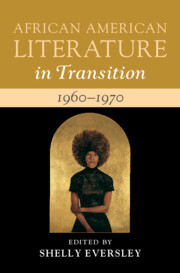Book contents
- African American Literature in Transition, 1960–1970
- African American Literature In Transition
- African American Literature in Transition, 1960–1970
- Copyright page
- Contents
- Contributors
- Preface
- Acknowledgments
- Chronology
- Introduction
- I Poetry and Music
- II Culture and Politics
- Chapter 5 The Rights of Black Love
- Chapter 6 Albert Murray Beyond Plight and Blight
- Chapter 7 Espionage and Paths of Black Radicalism
- Chapter 8 The Necessary Violence of Frantz Fanon and Malcolm X in Global Black Revolution
- III Beyond the Canon
- Index
- References
Chapter 5 - The Rights of Black Love
from II - Culture and Politics
Published online by Cambridge University Press: 10 November 2022
- African American Literature in Transition, 1960–1970
- African American Literature In Transition
- African American Literature in Transition, 1960–1970
- Copyright page
- Contents
- Contributors
- Preface
- Acknowledgments
- Chronology
- Introduction
- I Poetry and Music
- II Culture and Politics
- Chapter 5 The Rights of Black Love
- Chapter 6 Albert Murray Beyond Plight and Blight
- Chapter 7 Espionage and Paths of Black Radicalism
- Chapter 8 The Necessary Violence of Frantz Fanon and Malcolm X in Global Black Revolution
- III Beyond the Canon
- Index
- References
Summary
The assassination of Martin Luther King, Jr., is the armature supporting James Baldwin’s 1972 book, No Name in the Street. Just a few pages into the book, Baldwin observes: “Since Martin’s death, something has altered in me, something has gone away.” A spate of assassinations, and particularly King’s, prompts a profound crisis in Baldwin, forcing him to reexamine the ultimate power of love that had governed his life and work. Indeed, a decade earlier in The Fire Next Time, Baldwin had identified love as the key existential and political instrument to guide America out of its “racial nightmare,” in the same way that King had drawn on the Christian notion of agape love to imagine and enact nonviolent direct action to transform Jim Crow America. For Baldwin, King’s murder begins to actualize the apocalypse against which he had forewarned in the early 1960s, and moreover forces him to reckon with his own worldview of human life: “Perhaps even more than the death itself, the manner of his death has forced me into a judgment concerning human life and human beings which I have always been reluctant to make.” At the end of the 1960s, gone is the tempered optimism of Fire, the hope of achieving America, and instead we find in No Name a markedly new form of disenchantment that even love couldn’t temper. This essay traces how Baldwin’s perspective on love, loss, and life is altered by a decade rife with transformation and devastation, illuminating not only a pivotal period of Baldwin’s life and writing, but also of American life and letters.
- Type
- Chapter
- Information
- African American Literature in Transition, 1960–1970Black Art, Politics, and Aesthetics, pp. 119 - 145Publisher: Cambridge University PressPrint publication year: 2022

